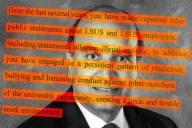You have /5 articles left.
Sign up for a free account or log in.

Victoria McCard
U. North Georgia
Under threat of termination, Victoria McCard -- the University of North Georgia Spanish professor who was pegged for termination following a verbal altercation with a visiting lecturer that triggered a larger investigation into her behavior -- has settled with the institution. She gets $40,000 and all claims against her dropped, and the university gets her retirement, effective the end of the academic year. Instead of a formal dismissal hearing, the matter was handled quietly with the help of an external mediator.
McCard's not talking in public about her case, according to the terms of her agreement. The same can’t be said of her colleagues, however, who are still hotly debating whether the university did the right thing in seeking to terminate a professor with an alleged long history of uncivil behavior, or whether it trounced on the tenure system with grave implications for remaining faculty members.
“I am not worried about tenure being under threat at this institution -- this was not an assault on tenure, this was a long period of time where these unacceptable behaviors occurred and for whatever reason never seemed to get resolved,” said Brian Mann, McCard’s onetime department chair who is currently the division head of world languages and cultures at North Georgia’s Dahlonega campus. “Ultimately these unacceptable behaviors accumulated and continued enough to where we had to do something about it.” Mann noted, however, that he’d never personally had an inappropriate interaction with McCard. Rather, he said he'd fielded various faculty complaints about her and some negative student evaluations during eight years as her chair.
In October, faculty members say, McCard had a series of hostile interactions with a visiting lecturer that led to an investigation into her past behavior. The investigation, conducted by a university human resources officer, revealed an alleged pattern of unpredictable, at times uncivil, behavior by McCard. The behavior involved some students but mostly other faculty members and went back at least 15 years.
The university put McCard on leave without a hearing before a faculty body and barred her from campus. In January, she received a letter from the university saying “you are to be terminated for cause,” citing various violations of the regulations in the Faculty Handbook and Employee Handbook -- including “discourteous” or disruptive behavior and interfering with the work performance of another employee.
Some of McCard’s colleagues applauded the move, but others publicly criticized the university for failing to give McCard a hearing before peers ahead of removing her from the classroom, as is recommended by the American Association of University Professors, among other procedural complaints. Others still thought her behavior -- even if extremely unpleasant at times -- did not rise to the level of termination; by all accounts, McCard never physically threatened anyone and she was an effective teacher and scholar.
Mann, along with seven other language professors -- including McCard’s current department chair, Elizabeth Combier -- published an open letter in the student newspaper, Vanguard, this week criticizing local media coverage of the case, which portrayed McCard as a victim of overzealous administrators; they said it was unfair to their position and factually inaccurate. They also defended the university’s actions against McCard.
“This action was not taken lightly, and perhaps most importantly, there was a long and well-documented history of unacceptable behavior that influenced the decision to place [McCard] on leave,” the professors wrote. “This particular situation aside, it is important to note that tenure protects faculty in many ways that are critical to the full functioning of the university.”
What tenure does not protect, the professors continued, “is abusive, threatening and bullying behavior, including but not limited to efforts to intimidate colleagues and students when differences or conflicts arise. It is important to remember that administrators have to balance many things, take into account many perspectives and consider the consequences of actions for all faculty, staff and students in our areas.”
The professors’ letter also says that the university followed its own procedures for faculty discipline, despite other faculty members’ claims to the contrary. The letter further criticized those nondepartmental colleagues of McCard’s who have defended her publicly, saying they have no up-close knowledge of the situation.
One of those defenders, David Broad, a professor of sociology at North Georgia, took issue with the letter. He said he’s seen the documents related to McCard’s case, and that the allegations against her consist of unsigned, at times vague complaints about her being overly aggressive and difficult to work with. Broad also said the university failed to afford McCard due process before stating it was seeking to terminate her; the faculty body that reviewed her case and recommended dismissal did not meet with McCard and seek to otherwise remedy the situation first.
Broad noted that McCard had requested formal mediation with her colleagues two years ago, and the university never responded.
A university spokesperson confirmed the settlement. Mann said various mediations were attempted within the department but that no outside professional was ever brought in because it was generally determined that that "wouldn't have changed the behavior." (Note: This paragraph has been updated from an earlier version to include Mann's comments about internal mediation attempts.)
“These people collectively to this day don’t really understand what they’ve done here,” Broad said. “They feel like because they didn’t get along with McCard and McCard apparently resisted getting along with them that they were [validated]. I also don’t think there was the serious administrative leadership that could have addressed the problem before it was this severe.”
Barry Friedman, a professor of political science who also has defended McCard, said her immediate colleagues were being disingenuous in saying in their letter that she was not fired, as local media initially reported. He referenced the January letter notifying McCard that she was “to be terminated for cause.” Friedman also said he thought the university only bowed to McCard’s request for mediation when headlines about her case started to appear.
“The truth remains that the administration declared its intention to fire [McCard] for discourtesy, which is not a legitimate basis for terminating the employment of a tenured faculty member, bypassed our evaluation processes and interrupted the termination process only when this shameful situation became known to the public,” he said via email.
John Beasley, McCard’s lawyer, said he could not comment on the faculty letter. He also said McCard could not talk about her case due to her agreement with the university. Inside Higher Ed obtained a copy of the agreement, which says that the university will recommend McCard for emerita status and remove the charges related to her case from her personnel file. A "mutually satisfactory" statement regarding her retirement will be sent to any third party who requests it. In return, McCard may not ever pursue a legal case against North Georgia. She will remain on leave until her retirement takes effect on June 1.
Beasley referred additional questions to an earlier statement about McCard’s case, alleging some of the actions for which she was criticized were not only protected by tenure but by free speech rights.
McCard’s detractors say her case is not about free speech. Combier, McCard’s current department chair, said she welcomed even passionate disagreement in her department but not intimidation, which is what she said McCard introduced. For example, she said, McCard threatened to "blackball" her in the tenure process when she was an assistant professor over a dispute about changing the intermediate Spanish textbook. Another major fight -- allegedly involving yelling by McCard -- started over a proposal to eliminate one of two required literature courses, she said.
Kristi Hislope, another Spanish professor and signatory of the open letter, said McCard sometimes intimidated students; one once complained to the department that she attacked him verbally, and he refused to take another class with her, Hislope said.
Combier said McCard had a “stranglehold on the department,” and that there’s been positive change since October. For example, she said, one professor proposed a Spanish for technology course, whereas previously he would not have done so for fear of McCard's reaction.
One of the reasons McCard’s case has captured so much public attention is that it brings up questions about what kind of behavior tenure protects and what it doesn’t. Just how rude or difficult can a person be before he or she compromises his or her own lifetime commitment from the institution?
According to the AAUP’s Statement on Professional Ethics, professors as colleagues “have obligations that derive from common membership in the community of scholars. Professors do not discriminate against or harass colleagues.” And the AAUP’s On Collegiality as a Criterion for Faculty Evaluation -- while opposing collegiality as a stand-alone criterion for faculty evaluation – recognizes “an obstructiveness or truculence that inhibits collegiality” and draws a line between a lack of collegiality and “efforts to obstruct the ability of colleagues to carry out their normal functions, to engage in personal attacks or to violate ethical standards.”
All that, along with professional misconduct or malfeasance, constitutes an independent basis for faculty evaluation and faculty discipline, said Greg Scholtz, AAUP’s director for academic freedom, tenure and governance.
Policy aside, outside experts say it’s hard to judge McCard’s case, since to this day no one beyond the institution (with the exception of her lawyer and the mediator) has seen her personnel file. With corroborated details few and far between, Henry Reichman, chair of AAUP’s Committee on Academic Freedom and Tenure and a professor emeritus of history at California State University at East Bay, said via email that “in the abstract,“ “abusive or threatening behavior, especially if it is prolonged, seems to me a legitimate ‘cause’ for seeking to revoke tenure."
But, he said, the standard of judgment “must be clear and due process protections as outlined in AAUP policies followed.” That means judgment by faculty peers who are not involved in the case at hand; otherwise, their opinion could amount to a kind of popularity contest, he said.
John K. Wilson, an independent scholar who’s authored several books on academic freedom, also said it’s impossible to judge the case without all the facts. Referring to the charges against McCard, however, he said, “I do think that ‘disruptive behavior’ is a very vague standard for firing a tenured professor, and many of the allegations seem tied to issues of being ‘discourteous’ rather than a violation of someone else's rights.”
Referring to the faculty letter, he added, “I also think that ‘bullying’ is a standard that has little definition or clear meaning, and should apply to how children treat other children, so it has no place in a college disciplinary system.”
UPDATE: After this story initially appeared, McCard said her lawyer gave her permission to talk about her case, since a term of her agreement was that she would not talk publicly about it unless details became otherwise known. McCard said that she reluctantly agreed to settle because there was no guarantee that the university president would have accepted any faculty appeal board's decision in her favor. Beyond that, she said via email, "I was prepared to refute the false allegations made against me by my department chair (with whom I had a long history of disagreements), but having
"When faced with these options, I decided to settle -- so I could move forward with my life and not have this hanging over my head, and stressing me out, indefinitely," she said. "Several colleagues who were supportive asked me why in the world I would want to return to a department that had treated me so badly and no longer wanted me around, and I had to admit they were asking an excellent question. Before this nightmare began, I was planning to retire in one or two more years. After dedicating 21 years to supporting the Spanish program and teaching and mentoring many, many [students], I imagined myself making a proud and celebratory exit, not being forced into retirement with my professional reputation under attack by my colleagues. This outcome is definitely not the one I wanted, but as we all know, 'You can't always get what you want.' Looking to the future, only time will tell if I got -- or will get -- what I need."









